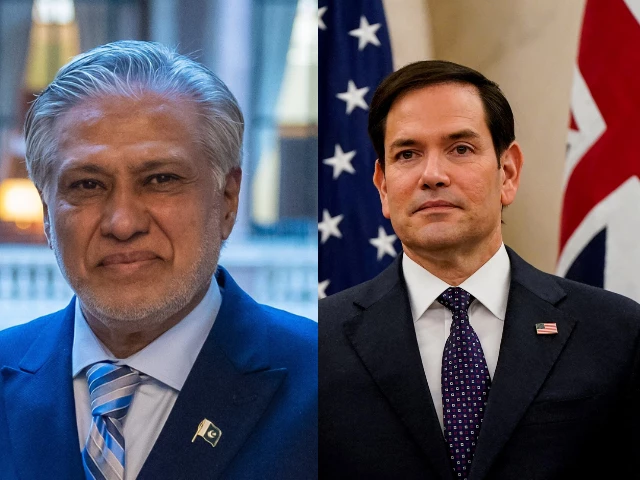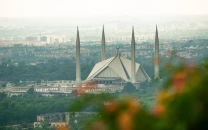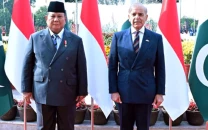Dar-Rubio talks to focus on regional tensions
Pakistan engages with all countries in good faith

Foreign Minister Ishaq Dar and US Secretary of State Marco Rubio are set to hold talks in Washington on Friday, the Foreign Office confirmed, saying bilateral ties, regional and international issues as well as India-Pakistan relationship would top the agenda.
"I can confirm that the meeting is scheduled for tomorrow, and the entire range of issues on the bilateral agenda, as well as important regional and global issues including the situation in the Middle East, and Iran will be discussed," Shafqat Ali Khan told reporters on Thursday at the weekly briefing.
"Exchange of views will also take place on the Pakistan-India question, for which we remain grateful for the role played by the US in de-escalation of tensions leading to ceasefire," he added.
The meeting between Dar and Rubio is part of renewed efforts by the two sides to revive the structured dialogue between Pakistan and the US. The Biden administration completely ignored Pakistan and there had been no or little contacts at the level of foreign ministers.
However, contrary to expectations, bilateral ties between Pakistan and the US have seen a positive turnaround since President Donald Trump began his second term.
Pakistan's cooperation to arrest one of the masterminds of Abbey Gate Bombing in Kabul in August 2021 led to the rapprochement. President Trump in his maiden address praised Pakistan's counterterrorism efforts.
What brought the two countries further close was the India-Pakistan conflict in May following the Pahalgam attack. While Pakistan acknowledged the Trump Administration's positive role in brokering the ceasefire, India kept challenging the US claims.
Pakistan in order to make further inroads at the White House nominated President Trump for the Nobel Peace Prize for his courageous leadership and peace efforts in the subcontinent.
Regarding reports of the US-Pakistan dialogue including discussion on Jammu & Kashmir and the Indus Waters Treaty (IWT), the Spokesperson confirmed these issues remain central to Pakistan's diplomatic agenda and are expected to be raised in the DPM/FM's meeting with US Secretary of State Marco Rubio.
Asked about President Trump's recent remarks about credit for defusing a near-nuclear crisis in South Asia, Khan said: "We have repeatedly acknowledged the role of friendly nations, including the US. The facts of that crisis are well known."
When asked, the Foreign Office spokesperson said Pakistan engages with all countries in good faith, and would continue to invite India to come to the negotiating table and move towards a peaceful settlement of disputes.
"But the key question is for India to decide what kind of policy it wants to adopt. As far as Pakistan is concerned, our position is very clear. We have, multiple times, acknowledged and thanked the US intervention and the role it played in the de-escalation of the recent crisis," Shafqat said.
"But again, it is for India to decide the route it wants to take, the policy it wants to adopt. Diplomatic engagement is not a favor extended by one country to another; it is in the common interest of both countries and of regional stability and global peace," he added.
Meanwhile, the spokesperson described Interior Minister Mohsin Naqvi's recent visit to Afghanistan as "very successful," saying it reflected the steady positive momentum in bilateral relations.
Shafqat said the visit should be seen in the broader context of improving ties, citing the Deputy Prime Minister and Foreign Minister's visit to Kabul on April 19, 2025, as a "watershed moment."
"There is a steady positive momentum in interactions, and the quality of relations has significantly improved. Both sides are working to further solidify the diplomatic gains, maintaining and accelerating this positive momentum," Khan said.
The spokesperson emphasized that the interior ministry's agenda primarily focused on security and counterterrorism — issues that remain a key part of discussions between the two neighbors.
"We have repeatedly reiterated what kind of relations we want with Afghanistan. However, one of the stumbling blocks is the sanctuaries enjoyed by terrorists there," the spokesperson noted.
He added that Pakistan had conveyed its concerns to Kabul, and the Afghan side was showing "receptivity" to these issues. "The technical discussions are ongoing. I cannot go into specifics, but in political terms, the visit was very successful," Khan said.
Highlighting the broader context of ties, the Foreign Office maintained that cooperation in the security sector must be viewed as part of the overall positivity and improvement in relations between the two "brotherly neighboring countries".




















COMMENTS
Comments are moderated and generally will be posted if they are on-topic and not abusive.
For more information, please see our Comments FAQ